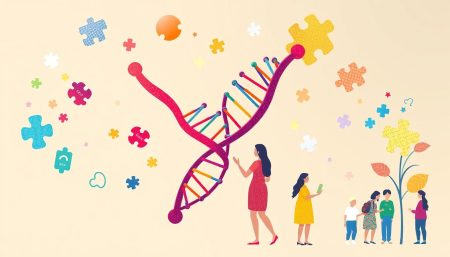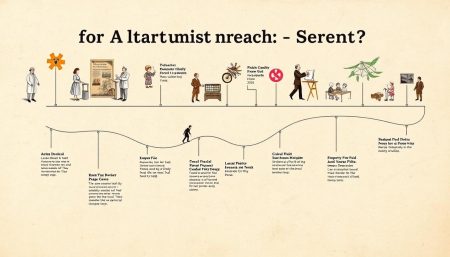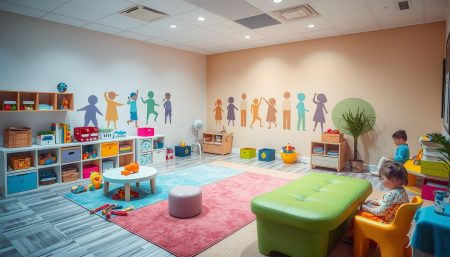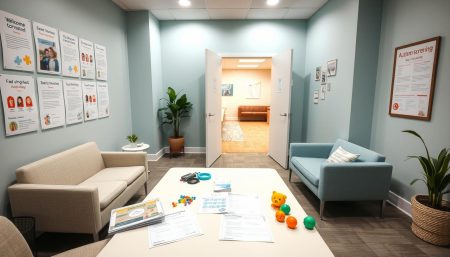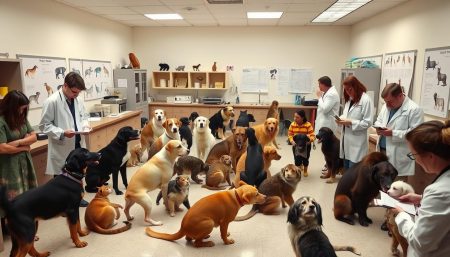What's Hot
- Alcohol Use Disorder DSM 5: Diagnosis Criteria
- Veterans: Alcohol Use & Sleep Apnea Connection
- Hair Transplant Pain: What to Expect
- Cost of Hair Transplant: What You Need to Know
- Is Hair Transplant Worth It? Explore Your Options
- Does Insurance Cover Hair Transplant? Find Out Now
- Affordable Dental Implants: Your Complete Cost Guide
- Dental Insurance That Covers Implants – Compare Plans
Autism
Spotting autism spectrum disorder symptoms can be hard. This guide will cover the three main signs experts look for when diagnosing autism. We’ll see how these symptoms appear in both kids and adults.It’s vital for families and caregivers to know…
The world of mental health is changing fast. Our understanding of autism spectrum disorder (ASD) is growing. Many adults wonder if they might have autism, leading to questions about diagnosis.Can psychiatrists help in this process? Today, they play a key…
Autism Gene: Is It Inherited From Mom or Dad?
The world of autism genetics is complex and fascinating. Scientists have long puzzled over the origins of neurodevelopmental disorders like autism. One burning question remains: Does the autism gene come from mom or dad?Genetic risk factors play a big role…
Getting an autism diagnosis can feel overwhelming. It’s natural to have questions about the autism diagnosis process and the autism specialists involved. This guide will help you navigate the journey of identifying autism spectrum disorders.Autism diagnosis requires a team of…
The history of autism is a captivating story. It spans from early medical notes to major breakthroughs. These discoveries have greatly improved our grasp of autism.The discovery of autism was not sudden. It took many years to develop. This journey…
Adult Autism Testing: Where to Find Evaluations
Finding where to get an autism spectrum disorder evaluation as an adult can change your life. Many people live without knowing they have autism. Now, adult autism assessment centers are popping up everywhere, giving hope to those searching for answers.Finding…
Applied behavior analysis (ABA) is a common therapy for autism. But, its effectiveness is a topic of debate. Is ABA really helpful, or has it been debunked?The debate about ABA for autism is complex. Some people say it works well,…
Why Is Autism Increasing: Understanding The Rise
Autism spectrum disorder (ASD) rates have been climbing steadily over the past few decades. This rise in autism prevalence has sparked concern and curiosity among parents, healthcare professionals, and researchers alike. Understanding the factors behind increasing autism rates is key…
Asperger’s syndrome has long been a topic of interest in the field of neurodevelopmental conditions. This guide explores its place within autism spectrum disorders. It sheds light on current understanding and expert insights.As we explore Asperger’s syndrome, we’ll uncover its…
Who Can Diagnose Autism: Expert Medical Guidance
Getting a correct autism spectrum disorder diagnosis is key for families seeking answers. Qualified autism diagnosticians are vital in identifying this condition. They use their skills to spot signs of autism and offer the right support.Autism changes how people interact…
Scientists and pet owners are curious about autism in animals. They wonder if animals can have autism. This question leads to interesting research on animal behavior.Studies on animal autism are revealing how different creatures see the world. Researchers are looking…
Ever felt like you don’t quite fit in? Struggling in social situations or feeling overwhelmed by sights and sounds? You might wonder if these feelings are signs of autism spectrum disorder.Spotting autism symptoms in adults is not always easy. They…
Understanding Autism: Key Insights & Support
Exploring autism spectrum disorder reveals a world as varied as our own. It impacts millions, showing differences in how we communicate, behave, and interact with others. Our goal is to raise autism awareness and empower those affected.
We aim to show the unique strengths and potential of each person. This guide is for parents, educators, and individuals on the spectrum. It’s here to enlighten and support you with compassion and understanding.
What is Autism Spectrum Disorder?
Autism Spectrum Disorder (ASD) is a complex condition. It affects how people interact, think, and behave. It’s known for autism characteristics like trouble with social skills, limited interests, and repetitive actions. The term ‘spectrum’ means ASD has a wide range of symptoms and severity.
Understanding autism in children can be tough. Symptoms vary a lot from one child to another. Some might struggle with talking, while others might not talk at all and have big behavioral issues. This makes each autism diagnosis special and needing a personal touch.
To learn more about ASD, its traits, and how to get diagnosed, check out the National Institute of Mental Health site. It’s full of useful information.
Getting an autism diagnosis means a team of experts will look at your child’s past and behavior. This step is key for making treatment and education plans that fit each child’s needs. Thanks to better awareness and tools, we can help children with autism live better lives through early support and care.
Identifying Autism Symptoms and Early Signs
Exploring Autism Spectrum Disorder, it’s key to grasp the early signs of autism and how symptoms change over time. This part dives into how autism shows up from birth to adulthood. It also highlights the role of behavior and social signs in diagnosing autism.
Detecting Autism in Infants and Toddlers
Spotting autism early is tough but vital. Parents and caregivers should watch for signs like little eye contact, not smiling or making sounds, and speech delays. These signs are important for early checks and help a lot in a child’s growth.
Recognizing Differences in Older Children and Adults
As kids get older, autism symptoms change. School kids might find it hard to understand social hints, make friends, or adjust to new things. Adults face challenges in social life, work, and keeping relationships. It’s important to notice these differences to offer the right support and strategies for each age.
The Role of Behavior and Social Interactions in Diagnosis
Diagnosing autism focuses a lot on behavior and social skills. Doctors look at how a person acts and interacts in different situations. This helps them understand the person’s needs and find the best ways to help manage symptoms.
Autism Causes and Research Development
Autism research is uncovering new insights into autism spectrum disorders (ASD). It explores how genetic factors in autism and environmental influences on autism interact. This knowledge is key to improving treatments and support.
Genetic Factors Contributing to Autism
Genetic studies have found many genes linked to ASD. They show that family history and genetics are important. This means autism is likely caused by a mix of genetic risks and environmental factors. Knowing this helps in finding ways to prevent and treat autism.
Learn more about preventing and treating autism.
Environmental Influences on Autism Spectrum Disorder
Studies are looking at how the environment affects autism. This includes things like air quality and chemical exposure. They aim to understand how these factors might increase autism risk.
This information is crucial for pregnant women and healthcare providers. It helps in reducing risks during important times of development.
Current Trends in Autism Research
Today, research combines genetic and environmental studies to understand autism better. New technologies and data analysis are changing how we study autism. This allows for more tailored therapies and support.
Large, multi-disciplinary studies are also advancing our knowledge. Projects funded by organizations like NIEHS are leading the way in tackling ASD.
Autism: Support, Treatment, and Education
Living with Autism Spectrum Disorder (ASD) means always learning and adapting. Finding the right support and treatment is key to a better life. Behavioral therapy, like Applied Behavior Analysis (ABA), helps by teaching good behaviors and stopping bad ones.
Speech and occupational therapies also play a big role. They help improve communication and daily living skills. These therapies are tailored to meet the needs of each individual.
Autism education is another important area. Schools for kids with autism focus on their unique learning styles. They use strengths and offer support where needed.
These programs include both learning and social skills. Teachers trained in autism are essential for creating these supportive environments.
Autism affects not just the person but also their families and caregivers. Strong support networks are vital. Groups and online communities offer a place to share, get advice, and find resources.
Parents and caregivers get strategies to strengthen family support. The goal is to give them the knowledge and support they need. This way, they know they’re not alone in their journey.
The combination of autism treatment, education, and community support is crucial. It helps build a more understanding and caring society.
FAQ
Q: What exactly is Autism Spectrum Disorder?
A: Autism Spectrum Disorder (ASD) is a complex condition. It affects social interaction, communication, and behavior. It’s called a “spectrum” because symptoms and abilities vary greatly from person to person.
Q: Why is autism awareness important?
A: Autism awareness is key for understanding and acceptance. It helps create better services and more inclusive communities. This leads to a better life for those with ASD and their families.
Q: How is Autism diagnosed in children?
A: Diagnosing Autism in children involves several steps. Pediatricians and specialists observe behavior and assess developmental history. They look for signs of delays and difficulties in social interactions.
Q: What are some early signs of Autism in infants and toddlers?
A: Early signs include not making eye contact and not responding to their name by 12 months. Not gesturing by 14 months and not speaking by 18 months are also indicators. These signs may lead to further assessments.
Q: Can adults be diagnosed with Autism?
A: Yes, adults can get an Autism diagnosis. Some may not be diagnosed until later. Getting diagnosed as an adult requires a professional who understands adult Autism symptoms.
Q: What roles do genetic factors play in Autism?
A: Genetics play a big role in Autism. Research shows that genetic mutations can increase risk. Autism can also run in families, suggesting a genetic link.
Q: How do environmental influences impact Autism Spectrum Disorder?
A: Environmental factors like prenatal exposure and birth complications can affect Autism risk. However, no single factor has been found to cause Autism.
Q: What are the current trends in Autism research?
A: Research focuses on genetics, brain imaging, and treatments. It also aims to identify Autism in diverse populations and understand its lifespan.
Q: What types of treatments are available for Autism?
A: Treatments include behavioral therapies, speech therapy, and occupational therapy. Medications may also be used to manage symptoms. Individualized education programs are crucial for children.
Q: How can education be tailored for children with Autism?
A: Education for children with Autism involves personalized learning. It includes structured environments, visual aids, and curriculum based on their interests. This approach enhances engagement and learning.
Q: Where can I find support if my child has Autism?
A: Support is available through autism advocacy organizations, online communities, and parent groups. Professional services like counselors offer valuable advice and emotional support.














